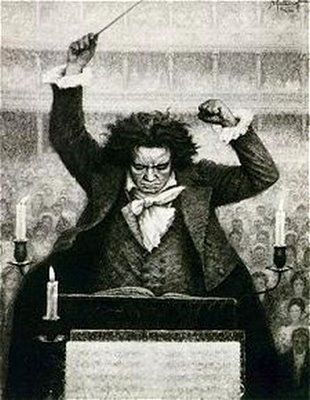What really went on when Beethoven premiered the 9th
OrchestrasFrom the new issue of The Critic:
Early in the morning of 7 May 1824, Ludwig Beethoven went for a haircut. This might seem a small issue of personal grooming, but with Beethoven nothing is insignificant. In a society where appearance was valued as much as existence — Schein über sein — Beethoven made a noxious fetish of self-neglect. He was unwashed and unkempt, his clothes frayed, his shoes unsoled.
Yet hours before the premiere of his Ninth Symphony, Beethoven took the trouble to locate a barber who would shave him and cut his hair, taking so much time that he missed lunch at home. Later, leaving for the concert, it was found he lacked a black jacket and would have to conduct in green…
Read on here.






This is Norm’s review of Theodore Albrecht’s wonderful new book, “Beethoven’s Ninth Symphony: Rehearsing and Performing its 1824 Premiere.” For more on the book: https://boydellandbrewer.com/9781837651054/beethovens-ninth-symphony/
John Rice took the words out of my ?mouth ?keyboard. It is indeed a WONDERFUL book, the kind of contextualizing which gives scholarship a good name. I thought that over many years I’d had a good grip on the circumstances around the Ninth Symphony’s premiere, but this volume expanded my horizons immeasurably
. Bravo to Theodore Albrecht!
Beethoven never conducted that concert, it was already to deaf to conduct. It is written in Albrecht’s book, Lebrecht’s review is imprecise and misleading (as most of his writings).
Accoprding to sources, Beethoven tried to conduct the piece and stood on the roster, but Umlauf conducted behind B, and he had instructed the players to not look at B but at him.
Excitedly searched to buy a copy, but – gulp – £70!
Thanks, John. I’m so perplexed by a book review that completely neglects to mention the name of the book!
How much did you pay for it?
What a beautiful story that is……
Has it become different nowadays?
The work of producing conducting score and orchestral parts is now done by the publisher. Rehearsels are organised by the orchestra and orchestral performing has been professionalized, complete with tenure, pension and union rules. Everything has been bureaucratised to get at an effective result, and composers are, in general, well-groomed also long before and after a première, even DURING a première in spite of the music. Technical level of playing has improved beyond any 18C imagination, and every player knows ‘the repertoire’ by heart.
Alas, nowhere a new Beethoven in sight, in spite of a level of over-education unique in world history. And many new works are rehearsed with an absolute minimum of rehearsal time, given the costs. In most cases, getting the notes in the right place is enough, because that is all that is required. Rehearsel time ‘for expression’ of a new work simply does not exist in the orchestral practice of today because that is never required. So, if Nature would, in its questionable generosity, produce a new Beethoven, he would not be noticed, because a) he would not be a modernist and would also refrain from superficial stuff and b) performances would never reach beyond the notes, so any ‘expression’ would remain in the score, and nobody would notice something missing.
Well, as we know Beethoven was ahead of his time, even anticipating jazz syncopations in one of his late piano sonatas.
So have you noticed how people dress today for so called “formal” occasions, or religious services or in fine restaurants
or for traveling on an airplane? Beethoven got there first. He probably had too much on his mind to bother with such things.
But, I, for one, am of the old school of polite etiquette as my mind is not otherwise preoccupied.
The article sketches a detailed portrait of Beethoven’s daily life following the debut of his Ninth Symphony but fails to delve into how these personal aspects influenced the musikalische Form or Satztechnik of the work.
While the author adeptly captures Beethoven’s personal challenges, such as financial distress and a pervasive sense of “existential misery,” the narrative stops short of examining the potential impact of these struggles on Beethoven’s musical articulation or thematic progression in his oeuvre.
Additionally, the piece transitions from an account of Beethoven’s routine to the conception of an “ethereal Bagatelle” without adequately exploring the connection between the two. The narrative would gain depth from a discussion on how this Bagatelle, belonging to the opus 126 set, mirrors Beethoven’s innere Welt and offers a stark contrast to the Ninth Symphony’s magnificence.
Furthermore, the article’s praise of Albrecht’s work as “indispensable” is proffered without a comprehensive music-theoretical evaluation. A more robust analysis would assess the publication’s contribution to our comprehension of Beethoven’s historical role in music and its implications for music aesthetics.
In conclusion, while the article is compelling, it would benefit from a more intricate and scholarly critique that links Beethoven’s personal adversities with his compositional heritage and the symphonic genre’s historical development. The discussion would be enriched by a deeper investigation into the interplay between Beethoven’s life experiences and his profound influence on Symphonik.
But was all of that the intention of the article? Criticising the absence of things that were not intended to be there in the first place, is like criticising apples for not being pears.
Yes! Maybe all of the “deeper investigation” is in the book itself!
Very enlightening read. Sometimes one gets the idea that some of the great symphonies were originally played in a slap dash, ad-hoc fashion by a smattering of decent musicians, slightly intoxicated musicians and poor musicians, and conducted badly (but earnestly) by the composer or casually by a maestro who didn’t understand the music. Yet here we have evidence that despite a generally ragged orchestra, efforts were made to find top musicians and two of the women soloists cared enough that they were physically ill. The conductor was good and doing his best and there were at least two rehearsals!
If we could go back in time to listen to the concert I dare say we would have plenty of bad things to say about the string section or the tempi or the failure of the orchestra to play together at some points but it must have held together enough to deliver its impact and power.
Sounds like an unsympathetic review of the Sinfonia of London’s ‘Daphnis and Chloe”.
$83 ??? Is it a college textbook? The author is a college professor.
can we all stop beating a dead horse.
“he lacked a black jacket and would have to conduct in green…”
In “Immortal Beloved” (1994) Gary Oldman’s Beethoven was dressed in black.
At over $80 college textbook price, I would buy it on Amazon, read it and return it. Just saying.